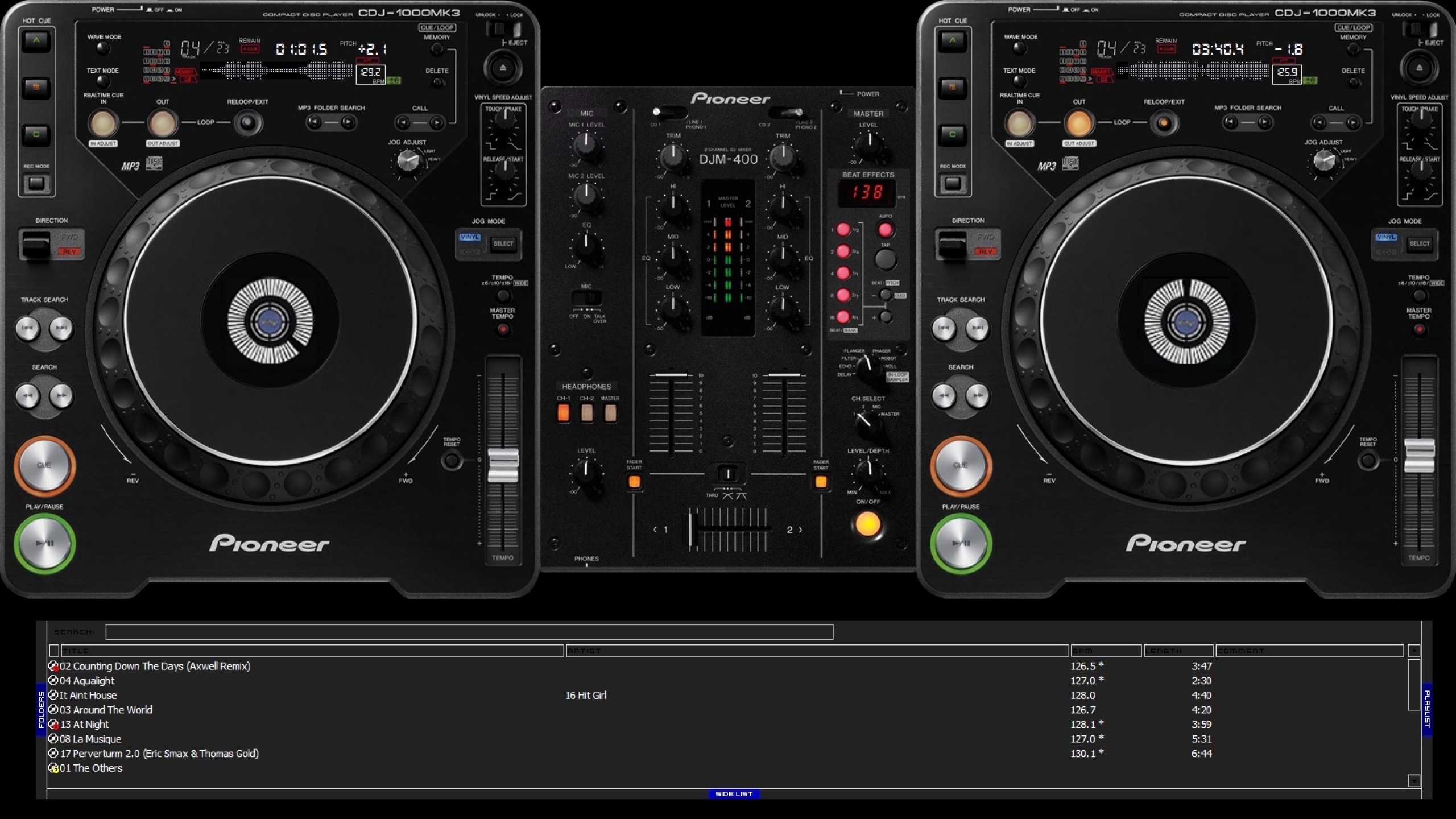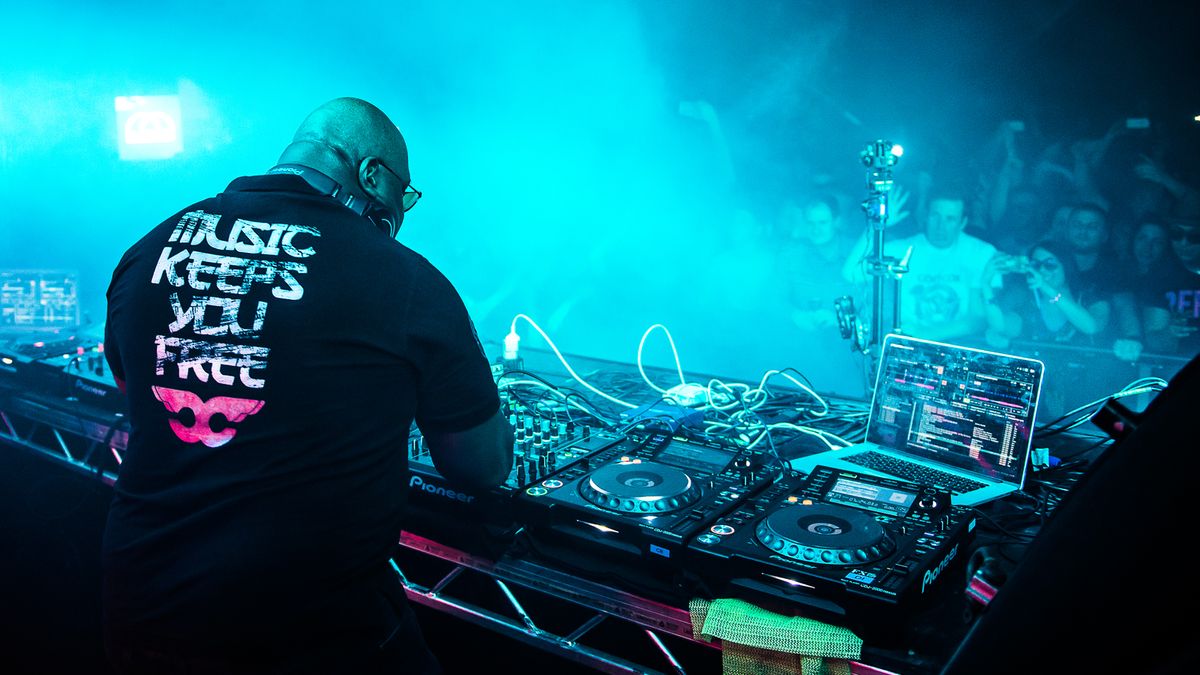Dj’s a creative unit – In the world of music, DJs stand out as creative units that weave stories, captivate audiences, and push the boundaries of musical expression. They are not just entertainers but artists who use their skills and passion to create immersive experiences that resonate with listeners.
From the seamless blending of tracks to the emotional impact of their curated musical journeys, DJs showcase their artistry in every performance. This article delves into the multifaceted world of DJs, exploring their techniques, influences, and the role they play in shaping popular culture.
DJ’s as Storytellers
DJs are not just music players; they are storytellers who use music to narrate tales that evoke emotions and create unforgettable experiences. By carefully selecting and arranging tracks, DJs craft musical journeys that take listeners on an auditory adventure.
The order and selection of tracks are crucial to the narrative. DJs consider the tempo, mood, and energy of each track to create a smooth flow that builds tension, releases it, and leaves listeners wanting more.
Emotional Impact
DJ-curated musical journeys have a profound emotional impact on listeners. The music can evoke memories, inspire creativity, and even trigger physical responses like dancing or crying. By tapping into the power of music, DJs can create experiences that are both cathartic and exhilarating.
The Creative Process of DJing
DJing is an art form that combines technical skills with creative expression. DJs use a variety of techniques to mix and blend music, creating a seamless and engaging experience for their audience.
One of the most important skills for a DJ is beatmatching. This involves matching the tempo and rhythm of two songs so that they can be smoothly transitioned into one another. DJs use their ears and a variety of tools, such as headphones and mixers, to achieve a perfect beatmatch.
Once two songs are beatmatched, DJs can begin to blend them together. This is done by gradually increasing the volume of one song while decreasing the volume of the other. DJs can also use effects, such as EQs and filters, to further enhance the blend.
Developing a Unique Style
Every DJ has their own unique style. This is influenced by their choice of music, equipment, and performance techniques. Some DJs prefer to play a wide variety of music, while others focus on a specific genre or subgenre. DJs also use different types of equipment, such as turntables, CDJs, and controllers.
And finally, DJs develop their own unique performance techniques, such as scratching, beat juggling, and looping.
The inspiration for a DJ’s style can come from a variety of sources, such as musical genres, cultural backgrounds, and personal experiences. For example, a DJ who grew up in a hip-hop culture may be inspired to play hip-hop music.
Or, a DJ who has a passion for electronic music may be inspired to play techno or house music.
The History of DJing
The history of DJing can be traced back to the early days of recorded music. In the 1950s, DJs began to play records at parties and dances. At first, DJs simply played one record after another. However, over time, DJs began to experiment with mixing and blending records.
This led to the development of new DJ techniques, such as beatmatching and scratching.
In the 1970s, DJing became increasingly popular. This was due in part to the rise of disco music. Disco DJs played a key role in the development of disco culture. They created long, seamless mixes that kept dancers moving all night long.
In the 1980s, DJing continued to evolve. This was due in part to the rise of hip-hop music. Hip-hop DJs developed new techniques, such as scratching and beat juggling. These techniques helped to create a new, more aggressive sound that appealed to a younger audience.
In the 1990s, DJing became a global phenomenon. This was due in part to the rise of electronic dance music (EDM). EDM DJs played a key role in the development of EDM culture. They created long, complex mixes that kept dancers moving all night long.
Today, DJing is more popular than ever. DJs are now playing at a wide variety of events, from small parties to large festivals. And, thanks to the internet, DJs can now share their mixes with people all over the world.
The Role of Technology in DJing: Dj’s A Creative Unit

Technology has played a pivotal role in the evolution of DJing, transforming the art form from its humble beginnings to the sophisticated and dynamic practice it is today. The advancements in DJ equipment have not only expanded the creative possibilities for DJs but have also made the art form more accessible to aspiring artists.
Evolution of DJ Equipment
The journey of DJ equipment began with the invention of the turntable in the early 20th century. These iconic devices allowed DJs to play and manipulate vinyl records, creating seamless transitions and innovative mixes. As technology progressed, CD players emerged, offering greater portability and durability compared to turntables.
However, the digital revolution truly revolutionized DJing with the introduction of digital controllers and software.
Impact of Technology on Creative Possibilities
Digital DJing opened up a world of new possibilities for DJs. Software like Ableton Live and Serato DJ provided DJs with unprecedented control over their music, enabling them to create complex effects, loops, and transitions that were previously impossible. The ability to store and access vast music libraries digitally also expanded the sonic palette available to DJs, allowing them to explore a wider range of genres and styles.
Enhancements through Software and Hardware
Modern DJ setups often incorporate a combination of software and hardware to enhance performances. DJ controllers, for example, provide a physical interface that allows DJs to control their software intuitively, while external effects units and samplers add additional layers of sonic manipulation.
The integration of lighting systems and visual projections further enhances the immersive experience for audiences.
Democratization of DJing
The advent of affordable and user-friendly DJ equipment has democratized the art form, making it more accessible to aspiring DJs. Digital DJing software and controllers have significantly lowered the barrier to entry, allowing individuals to learn and practice DJing without the need for expensive turntables or vinyl records.
Innovative and Groundbreaking Performances
Technology has enabled DJs to push the boundaries of their performances. DJs like Skrillex and Deadmau5 have incorporated live elements into their sets, using synthesizers, drum machines, and other instruments to create unique and immersive experiences. Visual artists have also collaborated with DJs to create stunning visual projections that complement and enhance the music.
Future of DJ Technology
The future of DJ technology holds exciting possibilities. Artificial intelligence and machine learning are being explored to automate certain aspects of DJing, such as beat matching and track selection. Haptic feedback and immersive audio technologies are also on the horizon, promising to further enhance the sensory experience for both DJs and audiences.
DJing as a Form of Art
DJing, the art of selecting and mixing recorded music for a live audience, transcends mere entertainment. It encompasses musicality, creativity, and technical skill, elevating it to the realm of art.
DJs possess an intimate understanding of music, seamlessly blending different tracks to create captivating sonic experiences. Their ability to read the crowd and adapt their set in real-time demonstrates a deep connection with both the music and the audience.
Creativity and Innovation
DJing fosters creativity and innovation. DJs experiment with various genres, tempos, and rhythms, pushing musical boundaries and introducing new sounds to the masses. They employ techniques like scratching, beatmatching, and looping to create unique and dynamic performances.
Cultural Impact
DJs play a pivotal role in shaping popular culture and musical trends. They introduce emerging artists and genres to a wider audience, influencing the tastes and preferences of listeners. Through their sets and collaborations, DJs have helped define musical eras and subcultures.
Interdisciplinary Connections
DJing intersects with other art forms, creating captivating experiences. DJs collaborate with visual artists to create immersive light shows that complement their music. They also incorporate performance art elements, such as storytelling and dance, into their sets, blurring the lines between different artistic disciplines.
The Business of DJing
The DJ industry is a dynamic and competitive field that offers both challenges and opportunities for aspiring artists. Understanding the business aspects of DJing is crucial for building a successful career.
Booking Agents and Venues
Booking agents play a vital role in connecting DJs with venues and events. They handle negotiations, contracts, and logistics, ensuring that DJs have a steady stream of gigs. Venues range from nightclubs and festivals to corporate events and private parties, each with its own unique requirements and expectations.
Financial Aspects
DJs earn income through performance fees, which vary depending on factors such as experience, reputation, and the size and prestige of the event. Contracts should clearly Artikel the terms of the performance, including fees, expenses, and any additional clauses. Marketing and promotion are essential for building a loyal fan base and generating bookings.
Challenges and Opportunities
Building a successful DJ career requires dedication, hard work, and networking. DJs must constantly evolve their skills, stay up-to-date with industry trends, and maintain a strong online presence. The industry can be competitive, but it also offers opportunities for collaboration, mentorship, and growth.
Types of DJ Performances
DJs perform in various settings, each with its own unique atmosphere and demands. Club DJs typically play extended sets in nightclub environments, while festival DJs cater to large crowds with high-energy performances. Corporate DJs provide entertainment for business events, while mobile DJs bring their services to private parties and weddings.
Role of Technology
Technology plays a crucial role in DJing, from music production software to DJ controllers and mixers. DJs must be proficient in using these tools to create and deliver seamless mixes. Advances in technology have also led to new opportunities for DJs, such as live streaming and online performances.
Networking and Relationships
Networking is essential for DJs to build relationships within the industry. Attending industry events, collaborating with other DJs, and connecting with promoters and venue owners can help DJs gain exposure and secure bookings.
Legal Aspects
DJs must be aware of the legal aspects of their work, including copyright laws and contract obligations. Understanding these legal responsibilities helps DJs protect their rights and avoid potential legal issues.
Current Trends and Future Prospects
The DJ industry is constantly evolving, with new trends emerging regularly. DJs must stay abreast of these trends and adapt their skills and performances accordingly. The future of the industry looks bright, with advancements in technology and the growing popularity of electronic music creating new opportunities for DJs.
DJing in Different Contexts

DJs perform in a wide range of settings, each with its own unique challenges and rewards. From the high-energy atmosphere of nightclubs to the intimate ambiance of weddings, DJs must adapt their performances to suit the audience and environment.
One of the most common settings for DJs is nightclubs. In these high-energy environments, DJs typically play a mix of popular dance music to keep the crowd moving. They often use effects and techniques to create a seamless and engaging mix that keeps the party going all night long.
Festivals
DJs also play a major role at music festivals. At these large-scale events, DJs typically perform on multiple stages, each with its own unique sound and atmosphere. DJs must be able to adapt their sets to the different audiences and environments, and they often play a mix of genres to appeal to a wide range of festival-goers.
Weddings
Weddings are another popular setting for DJs. At weddings, DJs typically play a mix of music that appeals to both the bride and groom and their guests. They often work closely with the couple to create a personalized playlist that reflects the couple’s taste and style.
Private Events
DJs also perform at a variety of private events, such as corporate parties, birthday parties, and holiday parties. At these events, DJs typically play a mix of music that is appropriate for the occasion and the audience. They often work closely with the event planner to create a custom playlist that meets the specific needs of the event.
– Explore the various methods of DJ collaboration, such as guest mixes, joint productions, and live performances.
Collaboration is an essential aspect of DJing, allowing DJs to share ideas, learn from each other, and create unique and exciting experiences for their audiences. There are many different ways for DJs to collaborate, each with its own benefits and challenges.
Guest Mixes
Guest mixes are a great way for DJs to showcase their skills and reach a new audience. A guest mix is a pre-recorded set that is typically played on another DJ’s show or podcast. Guest mixes can be a great way to get your foot in the door of a new scene or to collaborate with DJs that you admire.
Joint Productions
Joint productions are another popular form of DJ collaboration. In a joint production, two or more DJs work together to create a new track. Joint productions can be a great way to combine the strengths of different DJs and create something that is truly unique.
Live Performances
Live performances are the most direct way for DJs to collaborate. In a live performance, two or more DJs play together in front of an audience. Live performances can be a great way to create a unique and memorable experience for your audience.
The Future of DJing
As technology continues to advance and music consumption patterns evolve, the future of DJing holds exciting possibilities.
Technological Advancements
Advancements in artificial intelligence (AI) and machine learning (ML) are expected to have a significant impact on DJing. AI-powered DJ software can analyze music, detect patterns, and even generate mixes automatically. ML algorithms can help DJs personalize their sets, recommending tracks that align with their audience’s preferences.
Changing Music Consumption Patterns
The rise of streaming services has made music more accessible than ever before. This has led to a shift towards on-demand listening, which could influence the way DJs approach their sets. DJs may need to adapt to shorter attention spans and curate mixes that cater to a more diverse audience.
New Genres and Innovative Approaches
The emergence of new genres and experimental approaches to music is constantly shaping the art of DJing. DJs are blending traditional genres with electronic music, incorporating live instruments, and using unconventional techniques to create unique and immersive experiences.
Case Studies of Notable DJs

In the realm of DJing, certain individuals have left an indelible mark, shaping the art form and inspiring countless others. By examining the careers and techniques of these notable DJs, we can glean valuable insights and lessons that can guide our own DJing journeys.
Grandmaster Flash
Widely regarded as one of the pioneers of hip-hop DJing, Grandmaster Flash revolutionized the art form with his innovative techniques. He introduced the “quick-mix theory,” seamlessly blending records to create extended, uninterrupted mixes. Flash’s signature scratching and beat-juggling techniques became staples of hip-hop DJing, influencing generations of DJs.
Carl Cox, Dj’s a creative unit
A legend in the electronic dance music scene, Carl Cox has been pushing the boundaries of techno and house music for decades. Known for his energetic sets and impeccable track selection, Cox has played a pivotal role in shaping the sound of dance music.
His ability to connect with the crowd and create an immersive experience has made him one of the most respected DJs in the world.
Nina Kraviz
Nina Kraviz has emerged as a leading figure in the underground electronic music scene. Her sets blend elements of techno, house, and industrial music, creating a unique and hypnotic soundscape. Kraviz’s attention to detail and ability to craft intricate mixes have earned her a devoted following among electronic music enthusiasts.
Lessons from Notable DJs
- Technical Mastery:Notable DJs possess exceptional technical skills, mastering the art of mixing, beatmatching, and effects manipulation.
- Signature Style:They develop a unique and recognizable style that sets them apart from others, often incorporating innovative techniques and pushing the boundaries of the art form.
- Crowd Connection:Notable DJs have the ability to connect with their audience on a deep level, creating an immersive and unforgettable experience.
- Constant Innovation:They are constantly experimenting with new techniques and sounds, staying at the forefront of the evolving DJing landscape.
- Business Acumen:In addition to their artistic talents, notable DJs often possess strong business skills, managing their careers and building successful brands.
Interviews with DJs

Delve into the minds of renowned DJs as they share their perspectives on the art, industry, and future of DJing. Gather invaluable insights and advice from diverse backgrounds and experiences.
Through candid conversations, we’ll explore the technical prowess, artistic expression, and the ever-evolving landscape of DJing. Prepare to be inspired and informed by the wisdom of those who have shaped and continue to define this dynamic profession.
As a DJ’s creative unit, it’s essential to find innovative ways to engage with our audience. One effective approach is to experiment with creative ways to say welcome. Whether it’s through personalized greetings or unique icebreakers, these tactics help establish a warm and inviting atmosphere that sets the tone for an unforgettable experience.
By embracing creativity in our communication, we can create a memorable and impactful connection with our listeners, reinforcing our role as a dynamic and engaging creative unit.
Interviewee Background
Each interview will feature a prominent DJ with a unique story to tell. We’ll delve into their years of experience, genres of expertise, and notable performances or collaborations.
Perspectives on DJing
Discover the interviewees’ definitions and interpretations of DJing. Discuss the evolution of the art form, the interplay between technical skills and artistic expression, and the role of technology in shaping the craft.
The DJ Industry
Examine the challenges and opportunities within the DJ industry. Explore trends and innovations, the impact of streaming and social media, and the ever-changing landscape for DJs.
The Future of DJing
Delve into the interviewees’ predictions for the profession. Discuss emerging technologies and their potential impact, and emphasize the importance of creativity and innovation in the face of constant evolution.
Advice for Aspiring DJs
Gather invaluable advice for aspiring DJs. Identify essential skills and qualities, discuss the importance of networking and building connections, and emphasize the power of practice and perseverance.
DJ Mixtapes and Compilations
DJ mixtapes and compilations are extended mixes created by DJs, showcasing their creativity and storytelling abilities. These mixes often blend various music genres and styles, creating cohesive and engaging listening experiences.
To create effective DJ mixtapes, DJs employ techniques such as beatmatching, harmonic mixing, and EQ manipulation. They carefully select tracks that complement each other, creating smooth transitions and building an emotional journey for listeners.
The Role of DJ Mixtapes in Promoting New Music
DJ mixtapes play a vital role in promoting new music and shaping musical trends. DJs often include unreleased tracks or exclusive remixes in their mixes, giving listeners a glimpse into upcoming releases and emerging artists.
- Mixtapes provide a platform for DJs to showcase their musical knowledge and introduce new artists to a wider audience.
- They can create hype around upcoming releases and generate excitement for new music.
- Mixtapes help establish DJs as tastemakers and influencers in the music industry.
DJ Performances as Live Events

DJ performances transcend mere music playback; they are immersive experiences that captivate audiences with a unique blend of artistry and audience engagement. Unlike recorded music, live DJ sets are dynamic and interactive, allowing DJs to adapt to the crowd’s energy and create a tailored experience.
DJs engage with audiences through a combination of music selection, mixing techniques, and stage presence. They create seamless transitions between tracks, building momentum and energy throughout the performance. By reading the crowd’s reactions, DJs can adjust their set in real-time, ensuring the music resonates with the audience and keeps them engaged.
Lighting and Visuals
Lighting and visuals play a crucial role in enhancing DJ performances. Lighting can transform the venue’s atmosphere, creating a visually stimulating environment that complements the music. DJs often collaborate with lighting designers to create custom light shows that synchronize with the music, adding an extra layer of immersion for the audience.
Visuals, such as projections or LED screens, can further enhance the performance by providing a visual representation of the music. These visuals can range from abstract patterns to live camera feeds, creating a multisensory experience that captivates the audience’s attention.
The Impact of Social Media on DJing
Social media has revolutionized the DJ industry, providing DJs with unprecedented opportunities to connect with fans, promote their events, and share their music. In this article, we will analyze the impact of social media on DJing, discussing both the challenges and opportunities it presents.
Benefits of Social Media for DJs
- Connect with fans:Social media allows DJs to connect with their fans on a personal level, building relationships and fostering a sense of community.
- Promote events:DJs can use social media to promote their upcoming events, reaching a wider audience and generating interest.
- Share music:Social media platforms like SoundCloud and Mixcloud allow DJs to share their mixes and tracks with fans around the world.
- Build a brand:DJs can use social media to create a consistent brand identity, showcasing their unique style and personality.
Challenges of Social Media for DJs
- Time-consuming:Maintaining an active social media presence can be time-consuming, requiring DJs to allocate significant time to content creation and engagement.
- Overwhelming:The sheer volume of content on social media can be overwhelming, making it difficult for DJs to stand out and reach their target audience.
- Negative feedback:Social media can also be a platform for negative feedback, which can be challenging for DJs to manage.
- Privacy concerns:DJs need to be mindful of their privacy when sharing personal information or photos on social media.
Conclusion
Social media has had a profound impact on the DJ industry, providing DJs with both challenges and opportunities. By understanding the benefits and drawbacks of social media, DJs can harness its power to connect with fans, promote their events, and share their music.
As social media continues to evolve, DJs will need to adapt their strategies to stay ahead of the curve and maintain their relevance in the digital age.
Q&A
What is the role of a DJ?
DJs are responsible for selecting, blending, and playing music to create a cohesive and engaging musical experience for an audience.
What are some of the key skills required for DJing?
DJs need to have a deep understanding of music, as well as technical skills such as beatmatching, mixing, and track selection.
How do DJs create a unique style?
DJs develop their own unique style through a combination of their musical taste, technical skills, and personality.
What is the future of DJing?
The future of DJing is bright, with new technologies and innovations constantly emerging to enhance the creative possibilities of the art form.